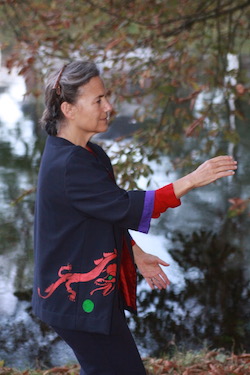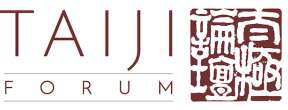Laura Stone Interview (part 3) from December 2018 by Connie Witte. This interview was published in the TQT (Dutch Taijiquan magazine) and translated by Laura Stone.
Grandmaster Chen has been coming to the Netherlands since 1978?
Yes, and in ’87 I came with him to Europe, to Cornelia Gruber in Switzerland, to Amsterdam where Maartje van Staalduijnen was active, and to Bremen, the school of Luis Molera.
After that I went to Sweden for two years before Grandmaster Chen went there, to the school of Claes Tarras Ericsson; to the school of Luis Molera in Bremen and to Linda Lehrhaupt in Bedburg, near Düsseldorf. Starting in 1988 I gave workshops every year in Europe.
What has kept you here?
 Love has kept me here. I met Fred van Welsem at a workshop. After we trained with GM Chen in New York together at Christmas time 1993, we spent two weeks on holiday in my house in the woods around Bloomington where we decided to get married. It took me a year to close my school and say goodbye to my students. From then on, I wanted to live a more integrated life, not only focused on my career. I taught T’ai Chi and started playing piano again. That is another common thread in my life, which I have picked up here again, the piano. We were looking for a place to start a new life, and that became Deventer.
Love has kept me here. I met Fred van Welsem at a workshop. After we trained with GM Chen in New York together at Christmas time 1993, we spent two weeks on holiday in my house in the woods around Bloomington where we decided to get married. It took me a year to close my school and say goodbye to my students. From then on, I wanted to live a more integrated life, not only focused on my career. I taught T’ai Chi and started playing piano again. That is another common thread in my life, which I have picked up here again, the piano. We were looking for a place to start a new life, and that became Deventer.
What do your workshops consist of?
What I do first is the body mechanics, applying the principles in the form, applications, push hands, and finally in boxing. I love boxing and enjoy teaching it. For me boxing is directly connected to the T’ai Chi form, principles and philosophy, and it’s delightfully active!
Everything from the internal feeling. I let people first touch themselves in a relaxed way. Then the next step of touching a partner is almost self-evident. Practicing together in an enjoyable way, which means: in an environment that is safe. I pay attention to everyone and see what it takes to do the exercise properly, and allow the space in which it is okay to try it out.
Push hands can very quickly become competitive, too hard; especially women get scared. I do push hands focusing on soft contact. The exercises I use are from GM Chen with influences from Dr. Tao Ping-Siang and GM Peter Ralston, so soft and effortless. I go very slowly and take a small piece of the interaction to practice, to try to overcome the reluctance, and to show that it is possible to connect. That is a conviction of mine: people want contact, we are social beings. But how exactly can you give permission, or better, space so that it’s okay?
Your husband, you said, became a lawyer mediator. Is fighting in the same relationship to T’ai Chi boxing and push hands? Or is being soft just meant to find an opening for an attack?
I’d like to go into this in more detail. Because for five years now, I have consciously known how that soft contact and boxing are connected.
When you feel attacked, you tend to fall back on your automatic reaction, which comes from your reptilian brain. I first heard about this from GM Peter Ralston; when you experience something aggressive, the reptilian brain reacts automatically. With T’ai Chi you can build a kind of foundation of softness and trust, of space and flexibility. It is also based on balance and harmony, when everything is connected and you are in your relaxed power. But you use your power in a conscious way, you know what you are doing. That effortless power comes from softness, from doing almost nothing. That is one of the most important things in T’ai Chi Ch’uan. For me, that soft, playful contact builds up that foundation. So we’re busy training something that’s not normal.
Let me go back for a minute: T’ai Chi Ch’uan is a defensive art. Your first reaction is always to connect, to go with (follow), to ensure your safety, and not to go against the force with force. You then have a moment, a fraction of a second sometimes, to see what is needed. There are powerful movements, maybe you need them, maybe not. So you train to create time and space. Make contact, so you’re also not running away. Also a reaction of the reptilian brain, if something scares you, you resist/fight of run away/flee. So make contact, physically, maybe also eye contact, you are fully present, you often let someone come very close, while keeping your own space, that’s what we train.
In boxing you also train the other way around, you see what happens when you give a punch or take a punch, there is more excitement generated from speed and power. How can you stay relaxed under pressure?
You are the aggressor?
I would say the attacker. And in doing so, you choose whether to let your force or aggression be felt, there’s a big difference. It may be that someone attacks you, not out of aggression, but out of a desire to survive.
In boxing, you first learn the technique in the style of GM Chen.
Hold up your hand,
and as quick as lightening, she punches my hand with her fist a couple of times.
I touch you fully but without penetration. Our automatic reaction is to press into your hand, but we don’t, we train “end positions”, so called memory shapes, which are positions of soft connectedness in structure. You then meet the resistance of the other person, his or her solidity. And I’m not going to let go, I’m going to meet it and I’m not going through it. In English we say “I stand my ground”. At the moment of contact there is space and connection in my own body everywhere, and I connect with earth and heaven.
That is the same as in PH, that I connect with your roots, with your whole body. My image for a good push is that of a parent who throws his or her child in the air and softly and solidly catches the child. My ideal push feels good and totally connected. In the PH-game you stay in contact and go along with your partner, often meaning that you don’t do anything for a long time. Until THE moment comes. I’m not someone who does very dramatic things, like the flowing, powerful uprooting of GM Peter Ralston or the soft joint locks of Dr. Tao Ping-Siang. If Dr. Tao only had a piece of your finger, you would know that if you moved even a millimetre, it would hurt a lot. You didn’t feel anything, only that it was completely locked, so beautiful. Recently I did a workshop with Tony Ward in Hannover and saw that staying in that softness is really possible. I realize that I don’t have such a training, but I do have very good basics and a continual feeling of spaciousness. You have to make a commitment to that softness, if you don’t, your reptilian brain will always play up. It is a lifeline.
Continue reading Laura Stone’s Interview part 3
- Laura Stone Interview part 1
- Laura Stone Interview part 2
- Laura Stone Interview part 4
- Laura Stone Interview part 5
